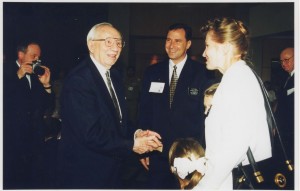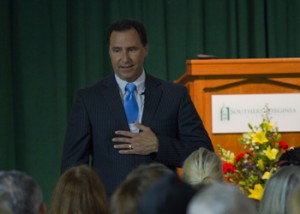
Michael Goodman, an associate professor in the Department of Church History at BYU, served two missions to Thailand – first as a full-time missionary and later as a mission president. He claims he learned in part how to be truly happy from Thais, who generally don’t allow external circumstances to dictate his own happiness.
Goodman said Thais often worked seven days a week for 12 to 14 hours a day in horrible conditions, but that they are usually happier than the average American.
“The Thai people taught me that happiness is truly not dependent on external circumstances. They didn’t like the drudgery and poverty they were exposed to, but they smiled anyway, and they decided that life is good and they would be happy,” he said. “It changed the way I looked at happiness. External things are real, but they shouldn’t rule us.”
Goodman didn’t always dream of going on a mission. He was a convert to the LDS church at age 18, but originally didn’t believe that Mormonism had anything he needed. He said he wanted to save the soul of his girlfriend who was investigating the church.
Goodman went through more than eight sets of missionaries over the course of his conversion. One pair of missionaries decided to stop teaching him after the first five months because he wasn’t willing to read the Book of Mormon. They simply told him they couldn’t help him if he wasn’t willing to read it.
“When they said that, it made me mad. So I said I’d disprove the Book of Mormon by reading it,” Goodman said. “That was the beginning of all things good and lovely in my life.”
He said he became sorely amazed by what was written in the Book of Mormon just a half hour after he began reading. He called the missionaries back, and they began teaching him and he progressed. The amazement he had reading the Book of Mormon at that time has stayed with him ever since.
Kaisa Goodman, Michael Goodman’s daughter, said one quality she loves about her father is his ability to love “literally everyone.” She said he pays special attention to people who are often considered “unlovable or weird” and makes sure to show love to them the most.

Kaisa Goodman said her father has always encouraged her to do the same. One time she was asked on a date she didn’t want to go on, and he told her she needed to remember just one thing and the date would be 10 times better. He told her to “leave (her date) better than she found (him).”
“Ever since then, that has been my motto in life — ‘leave everyone better than you found them.’ Make people feel good about themselves,” Kaisa said. “Everyone needs a little kindness.”
Goodman said he has always sought to involve his whole family in church service with each calling he has had, including his service as a bishop, ward mission leader and mission president. He always tried to make sure church wasn’t an “island” where he went to go do service but was central to his family’s lives.
Goodman teaches about dating and courtship in his marriage and family preparation classes, but he learned the virtue of perseverance in dating when he courted his wife, Tiina. He met her at LDS institute when they were both returned missionaries; he served in Thailand, she served in her native Finland. For three months they “dated hard,” Goodman said, and he proposed to her. They were married three months after their engagement.
Goodman has also made an impressive impact in the field of marriage, family and human development, according to Mark Ogletree, who works with Goodman in the Religion Department. Ogletree was mentored by Goodman when he first came to teach religion at BYU and considers Goodman to be “a true saint.”
“He’s the most optimistic, positive, happy, outgoing, caring person I’ve ever met. His enthusiasm and optimism is very contagious. He’s never had a bad day,” Ogletree said. “I’ve never met anyone more positive. He builds, he edifies and no matter how hard things are, he’ll always say, ‘Whelp, the gospel’s true.'”
Annie Christensen, a senior majoring in secondary education, has taken four classes from Goodman. She said she enjoyed his enthusiasm and passion for teaching. Goodman memorizes all his students names before the semester starts, so he feels he has a more personal connection with them.
Christensen said she most admires his ability to face life’s trials with courage, optimism and faith. She said he seems to welcome challenges because he knows they will make him a better disciple of Christ.
“I once asked (Goodman) about his ability to maintain perspective and optimism amidst severe opposition. His response surprised me,” Christensen said. “He said, ‘I just know I don’t want to inherit problems before they become problems. So I refuse to see them as such until they don’t give me any other choice. And even then, who gives them the right to rob life of love and joy?'”
Goodman’s positive attitude impacted his time as a mission president in Thailand as well. When he first became a mission president in 1997, there were about 12,000 baptized members in the country but only 800 were going to church. Goodman said that “made him weep,” because he loved the people so dearly from his previous mission service in Thailand.
Goodman focused on guiding his missionaries to think deeply about the reasons behind teaching to invite the Spirit rather than simply teaching for numbers of lessons. As missionaries applied good principles throughout the mission, church attendance doubled in three years and grew more than it had in almost 20 years.
Goodman said he learned on his missions to passionately love the people he served. He learned to love the Lord and God and that he always wanted to feel close to Heavenly Father in life.
“No matter what, I never want to lose the ability to sense God’s fingerprints in my life,” Goodman said.




